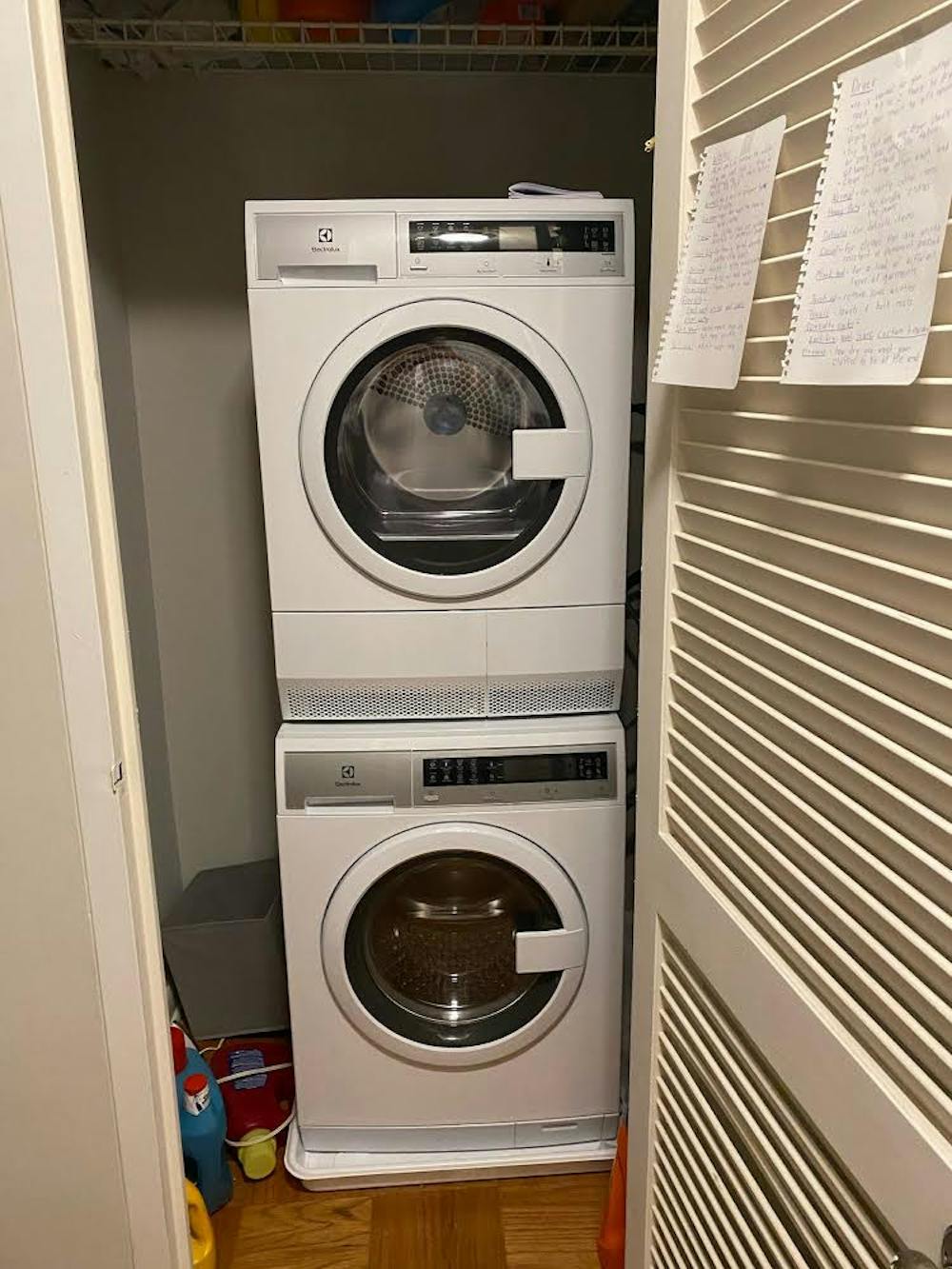
For two whole days, our apartment was filled with the deafening racket of drills and hammers. A few weeks before, we had decided to get our own washer and dryer units to avoid using the communal laundry room a couple floors down.
When the plumbers came up to our place with their toolboxes and buckets, they set up sheets of tarp that covered the wood floor and sealed off the area around the closet where the machines would be installed. They bored holes through walls, connected hoses through multiple closets and installed new inlets and outlets that were presumably connected to the water supply, drainage and electricity.
I was not only surprised with how long the installation took but also with how elaborate and effortful it seemed. Witnessing the plumbers’ heroic ordeal gave me a new kind of appreciation for laundry — for the intricacy of the units, for its ingenious employment of various types of resources, for the role it plays in our daily lives.
I think laundry is underrated. The activity of doing laundry doesn’t attract much attention to itself; laundry machines are usually tucked away in closets, storage areas or wherever there’s space in a household. Many people view it as something tedious and boring. Other appliances like refrigerators, dishwashers and microwaves, as well as the tasks associated with them, seem to take on a more active role in our daily lives; they might look more important but are hardly more exciting than laundry. I’m here to tell you that we ought to give our washers and dryers more love.
I would say laundry machines are as important as any other appliance. This is especially true for showers because, to me, doing laundry and taking showers are analogous activities. Showers are supposed to sanitize your body, while laundry is supposed to sanitize its longest-enduring companion: clothing. Clothes play a huge role in our daily lives, and keeping them clean, along with our bodies, is a crucial task.
It’s ironic that I’m thinking about the significance of laundry — this weird equivalent of a shower thought at 3 a.m. — mostly because I don’t go outside as much. There are fewer chances for my clothes to get dirty, and nowadays I wear a much smaller variety of clothes than I would if I were going to school in person. But I think it’s the very circumstances of this irony (as well as the noisy two-day project) that have simplified my relationship to clothes and brought my attention to the idea of laundry. The need to wash one’s clothes seems almost like a fundamental human need on par with needs like eating and bathing.
Humans’ relationship to laundry stretches all the way back to antiquity. One of the reasons why many early civilizations thrived is because they had access to bodies of water that not only supported the food supply and enabled transportation but also served to clean clothes. In ancient Christian ablution rites, the washing of the body often took place alongside the washing of one’s clothing as an emblem of spiritual purification. During the time of the Roman Empire, people took their dirty clothes to the fullonica, which was the ancient equivalent of a laundromat, like St. Paul Cleaners down the street. Except the Romans used urine instead of Tide for detergent. (The ammonia in urine can act as a cleaning agent, but I guess that doesn’t make it any less gross.)
Since that time, the activity of laundry has taken on many different forms. In the Middle Ages, it was a tedious protocol that involved soaking clothes in great wash tubs filled with lye, washing them multiple times, rinsing them and then finally drying them. This process, which often took multiple days, was largely replaced by the use of the washboard with soap at the dawn of the Industrial Revolution. We first begin to see the washing machine come up in the 18th century after Jacob Christian Schäffer published his first designs of a crank-operated wooden cylinder spun by hand.
Our modern washers and dryers are the culmination of a long and interesting history, and the relative ease and convenience of doing laundry nowadays compared to hundreds (and even thousands) of years ago is an unequivocal boon. But I think this convenience has made us forget the wider significance laundry plays in our lives, especially as Hopkins students. Like so many other aspects of modern life that have been automated away (I think of curated meal subscription plans, the iRobot Roomba and Tesla’s self-driving cars), the act of doing laundry fades behind the priority of saving time, not to have more time to relax, as one might think, but to have more time to work and study.
It’s taken me a few months in quarantine to realize that there are very few times in the day that I’m not in front of a screen, either reading or studying. Although I cook and occasionally take walks, on days when I’m unusually busy, I’m not doing much of anything that is away from my computer or my phone. The only exception is on the weekends when I’m cleaning the apartment and my clothes. I think of how people used to wash their clothes by hand, tend to underground pits to keep their food from rotting or nurse earth ovens to heat and bake food.
I realize it’s a silly thought (as is this entire essay), but I wonder if life would be somewhat more peaceful if these kinds of basic activities — opportunities to unplug and do something marked as much for its tedium as its physicality — had greater prominence in life. In all likelihood I know I would feel less eye strain at night.
This brings me to my next point. Despite being such a basic activity that doesn’t even take up a significant portion of my day, I think doing laundry also has a strange kind of pleasure to it. Cleaning my clothes each week feels rejuvenating, and I think folding laundry is a nice, 15-minute diversion from other tasks at hand. How many times have you heard someone say that one of their simple pleasures is the smell of fresh laundry? That redolence signifies many things: a clean set of clothes, a refreshing start to a new week, maybe even the beginning of adult life. It also marks a meditative moment of stillness.
Jae Choi is a senior studying neuroscience and English from Carrolton, Texas. He is an aspiring M.D. candidate. In his column, he enjoys exploring ways of finding new significance in everyday activities and making sense of extended stays at home during the pandemic.





